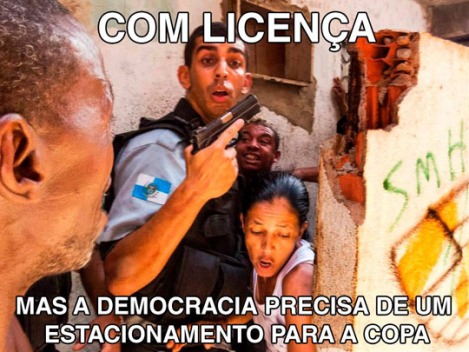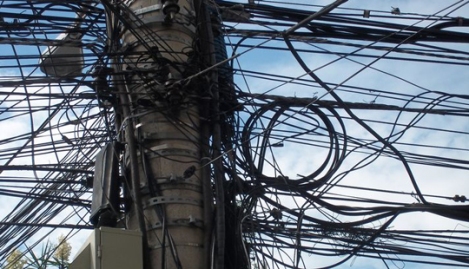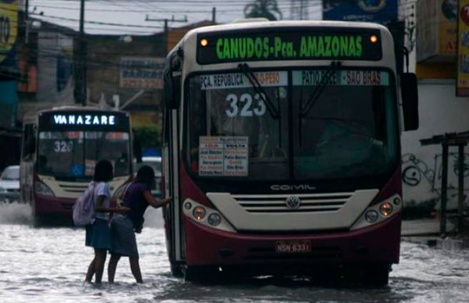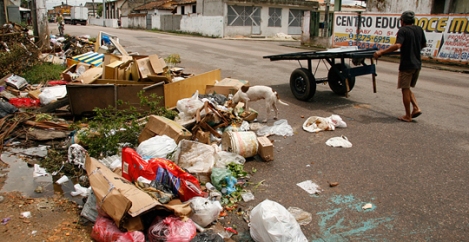
Pardon me, you have to abandon your house, the democracy needs a parking lot for the World Cup
In my series of articles about the World Cup in Brazil, and there is more to come in the near future, I have written about the street protests in Brazil and the almost certainty that further protests will be organised during the World Cup, which starts in June this year.
Why these massive demonstrations? The general view in the world is that Brazil is doing a good job. An emerging economy where poverty is diminishing and a middle class created. The standard of living is increasing. Furthermore the worldwide impression is that the Brazilian only is interested in his female beauties and football. Why are “panem et circenses” (bread and games) not enough for this generally peaceful people? Brazil doesn’t have natural enemies, no aggressive neighbours. It does have armed forces, but they are in no way on the alert for a sudden invasion of a foreign power. And still, in the face of Brazil as host of the World Cup, street protests, sometimes violent, started and will continue to shock the world.

A typical example of Brazil’s hi-tec telecommunication system
But the question remains: Why? In a country with so many shortcomings, which need urgent attention, and so many life-saving projects failing, the government is blowing away some 25 billion USD for the World Cup 2014 and probably a similar amount for the Olympics 2016 just for the fun and benefit of a selected and greedy group.
Corruption is rampant in Brazil and the people know that the many billions invested in the two international events, will be paid by them as at the final end when the bill will be presented, while the same money could have been used for public projects benefiting the people.

But it isn’t only the corruption, the Brazilian is fed up with the fact that internationally Brazil belongs to the low-level education countries with functional illiteracy still dominant even under the youth, who drop out of school too early. Public transport is a mess, ruled by the transport mafia and corrupt councilmen. If you want to die quickly, go visit a public health facility in case of an emergency or even a simple cold for that matter. Infrastructure is absent and roads are either not paved, overflooded or full of potholes. Everywhere you see open sewers and proper sanitation facilities are suspiciously absent. When it rains, and it does that often, the streets are like rivers, even entering people’s houses. Year after year, after year.
To visualise what I have written here, take a look at the two videos (spoken in English), made by a Brazilian filmmaker as she states (a bit sarcastically) that Brazil is ready to welcome you to the World Cup 2014.
The conclusion is, that the street protests require government action in the following areas: corruption, education, health care, public transport, sanitation and in general security. There are more wishes, but they are either of minor importance or of local or regional character.

Although in Brazil “football is King” and the Brazilian national football team will go for its sixth world championship, it isn’t strange that the World Cup triggered the street protests. In the first place the people see the enormous waste of money, while they suffer under the lack of basic public facilities. They undergo the dictatorial actions of the local government, like evictions, demolishing and gaffes, to reach its goal. The smell of corruption is heavy in the air.
But above all, it is election year. Due to the World Cup we might forget it, but this year the president is either re-elected or a new one enters the scene. Senators, members of Congress, Governors and many local representatives are up either for re-election or kicked out by the voters.
Politics in Brazil is a “dirty” business. More than half of the politicians are either convicted criminals or party in a criminal process. The impunity of politicians is one of the many frustrations of the voter. The, so called, “ficha limpa” (Clean Record) will be implemented this year, meaning that only “clean” (criminal free) candidates can run for a public function. The law makes a candidate who is convicted by a decision of a collective body (with more than one judge) ineligible for eight years, even if there is the possibility of appeals. That sounds positive, but don’t overlook the immunity of a sitting politician. Dirty? No problem as long as he occupies a seat, he can’t be convicted, only by the Supreme Court. And they are overworked.

Photo: Fernando Araújo
Does it help? Well, for the elections of 2012 1,340 potential candidates were barred. The figures for this year aren’t yet available, but I expect a higher outcome, although the “big mafia bosses” or regional oligarchs (the Sarney-clan, the Barbalho-clan and many more) as well as the religious zealots will return without any struggle and laughingly take their seats in the Senate, as votes are bought and nothing changes. Business as usual.
Update:
But will it be business as usual. Apparently and finely the Brazilians are fed-up with the authorities. The last few weeks in various cities and towns a whole range of city buses are gone up in flames, cars are burning and the police is attacked and molested. All in retaliation of the gross abuses of the police operating in and around the favelas, which has costs already the lives of several innocent people and bystanders. In the photo gallery you can see the most recent disturbances in Rio and São Paulo.
I really wonder what will happen during the World Cup which starts within 40 days. I’m very afraid of the incompetence of the police and security forces during this period, as incompetence is the only thing the authorities show. The situation is ripe to explode. It’s too cheap to call it vandalism, while it’s an expression of the disaffection of the people with the authorities.

Pingback: Planning for FIFA World Cup and Rio Olympics off to a bad start | News 12·
Pingback: ‘Please, take these Olympics away from us’ | zoomobiledev·
Pingback: ‘Please, take these Olympics away from us’ | Optus Zoo News (Mobile Staging)·